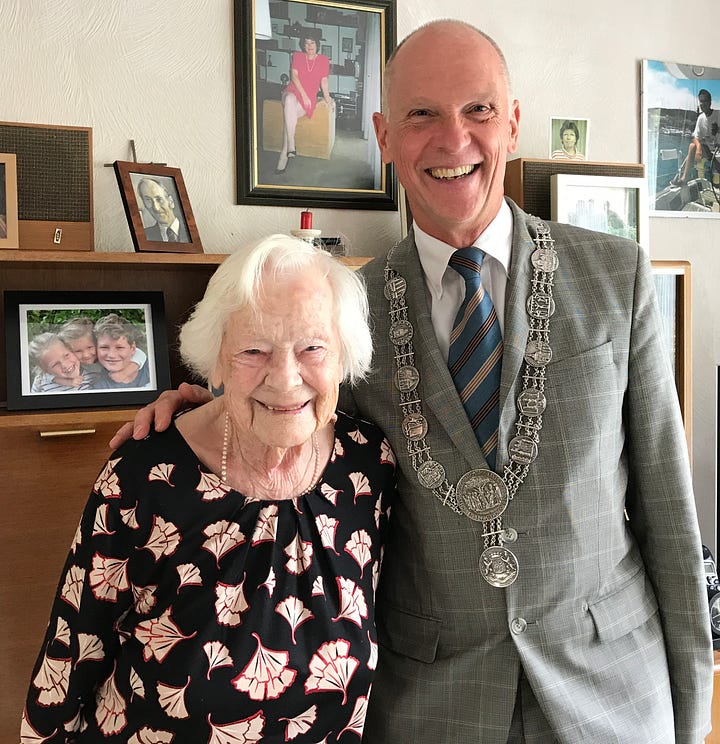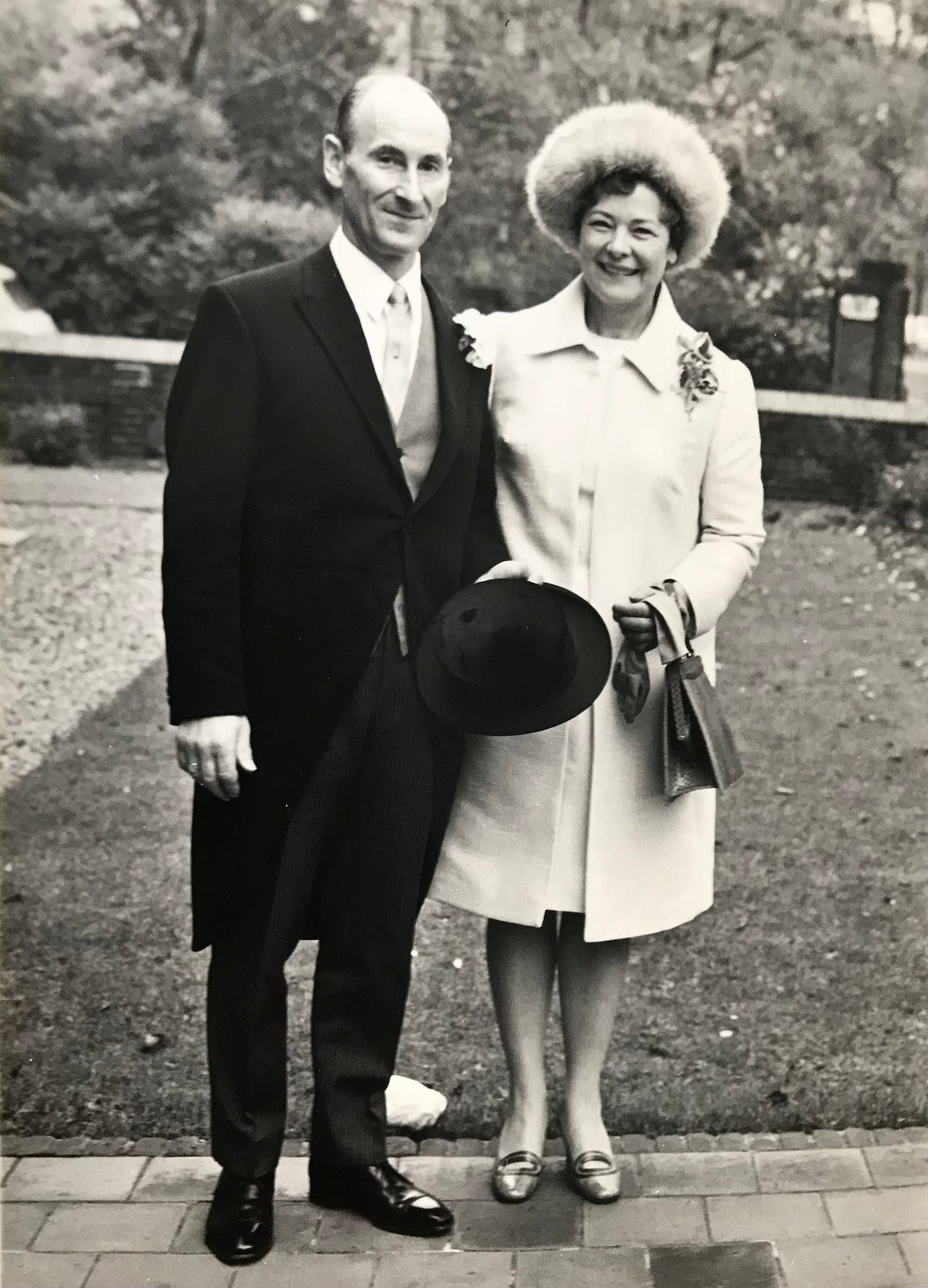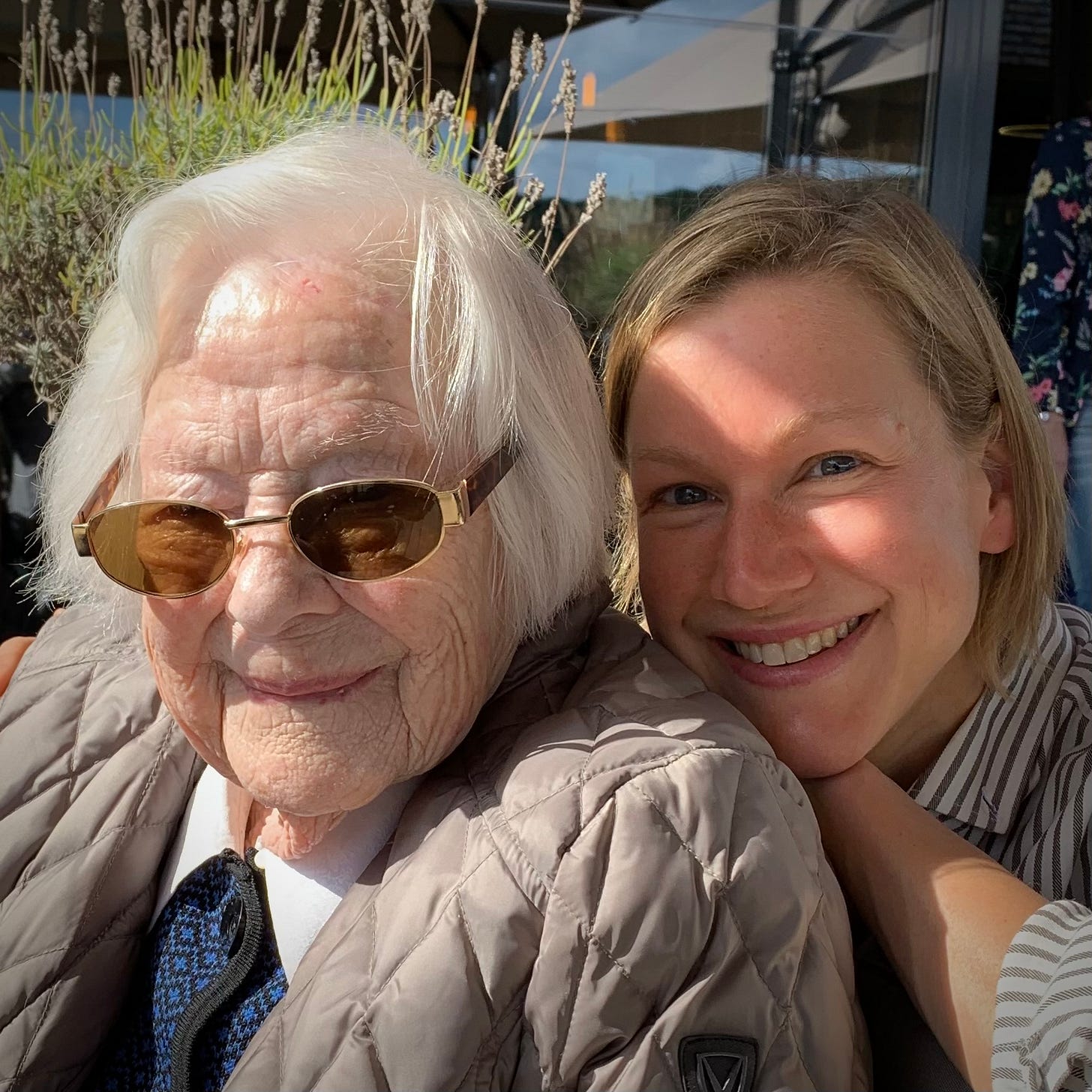My Dutch grandmother dyes her hair ash blond until she’s one hundred years old and holds a century of knowledge.
For the longest time, she smells of rouge, and whenever she looks a bit clownish, because her eyesight is bad, we kiss Oma on the cheeks, then wipe off our pretend lip prints to rub off her excess rouge.
Occasionally, a skin cancer sprouts from her jaw like a mushroom. She tries to camouflage it with powder, until one of us succeeds in convincing her to have it removed.
Her hands are as delicate as lace and as soft as her cashmere-covered breasts. But if she catches me admiring her hands, she gets vexed; aging is ugly in her eyes.
I remember Oma’s hands from long ago, knitting wool garments. My one-of-a-kind Pink Panther sweater was my ten-year-old pride and joy.
When she’s ten, she’s not allowed to knit, play, bike, or read on Sundays. She lives in Klundert, a village in Brabant, the religious south of the Netherlands. Sundays are for the worship of God.
Fridays after school, she and her six siblings race home, because whoever arrives there first, gets to pop the biggest sugar-butter ball into their mouth. Mother churns the butter herself, yet buys flour on the market. The flour is expensive and she won’t waste it on baking cookies. Sugar-butter balls are as good as it gets.
Berries are abundant in Oma’s youth, fresh from the bushes or as jams. But picking them is no picnic. She and her sisters work hard every day on the family land.
Her stockings underneath her petticoats are black like dirt. Father doesn’t allow colors on the legs of his daughters. He belongs to Klundert’s Reformed Church, which in my youth we will call the “black-stocking church.” But Father sometimes lets Oma get away with wearing brown, which Oma considers more elegant.
Oma sticks chewing gum on her head to receive Mother’s permission to cut her hair fashionably—ungodly—short.
As a barge skipper, Father ferries potatoes from below the rivers to the cities where the perverted Catholics live. The cities call to teenage Oma like foreign lands she longs to explore.
Vincent van Gogh was born in Zundert, a village in nature and distance close to Klundert. During his cold and austere youth, he sought comfort in drawing. In 1869, at age sixteen, he escaped the religious conservatism of his family by working for an art dealer in the political capital The Hague.
Oma makes her exit and entrance at the same age, sixteen, yet she does it in 1933. She leaves her family to become a maid for two wealthy protestant spinsters in The Hague. Within months in the city, she falls in love with a grocer of the wrong creed.
Their romantic highlight is watching the fireworks over the Scheveningen harbor. Her virtues and desires are like two horses running down a track.
Despite Father’s renouncement of her, she marries the Catholic grocer. After the war, she wins prize after prize for selling the most Florida oranges in Holland. She will never get paid as a grocery employee working alongside her husband, but she will receive engraved plaques and airplane tickets to Florida. She meets the governor there—twice.
For as long as I’ve known her, she has loved smoked salmon with a glass of quality Chardonnay. She offers the mayor a glass of wine each time he comes to congratulate her on her birthday. It’s what small-town Dutch mayors still do for their centenarians. On September 8, 2024, she turns a 107.


Several years before my grandfather dies of a diseased heart at age fifty-nine, my grandparents buy an apartment on the Spanish coast. They want to retire there. After his first attack, they sell the place and settle in the calm of Oosterhout, close to Zundert and Klundert, among the woods.
Loneliness crusts in the pleats of her pants for nearly five decades.
My grandfather, the grocer, the man I only know from his yellowed portrait, wanted to be a forester. Unlike humans, trees don’t steal from one another, he supposedly said.
In my youth, Sundays at Oma’s are a plethora of foods: French cheeses, more than we can eat, American sodas, more varieties than we can stomach, thickly sliced salami, more than fits on the glass coffee table, wine-cooked pears, chocolate-covered raisins, roasted cashews, and more.
She lost my aunt, her only daughter, to cancer of the breast.
She lost my father, her only son, to cancer of the stomach.
They were in their early fifties.
Grief smudges Oma’s silk blouses for over twenty-five years.
Births and marriages revive her. She travels to Volterra, Italy, for my wedding when she’s already 91. She holds eight great-grandchildren on her lap, not all at the same time, and tells them stories about the living and the dead.
She has known life without televisions, without female voting rights, without enough wool to knit baby clothes.
When she’s pregnant with her first child, my aunt, during World War II, and the Germans help themselves to Dutch cattle and crops, a spoon of lard becomes a luxury.
Near the end of the war, she watches a grenade roll into Father’s shelter, where she, her newborn, and other family members are hiding, and she watches it roll out through the exit before it explodes.
A soldier pokes the barrel of a gun into the shelter a day after. Everyone holds their breath, including the baby. But the man is a liberator and speaks English.
Oma’s maiden name is Langeweg—Longway.
For the longest time, her mind stays as sharp as her blue eyes are cloudy.
When she begins to stumble more frequently, after her 102nd birthday, we urge her to move into a care home. She sacrifices her elegant leather shoes yet keeps wearing her silks and cashmeres. She still cares about how she appears.
In 2020, she signs a Don’t Reanimate statement, saying that time feels too slow and getting old is no fun. But when she contracts pneumonia in the care home, possibly COVID-19, and she flickers like a candle, she asks the doctor for antibiotics. She is illuminating the room again within days.
Each time I observe an old lady somewhere in the world, fussing over her clothes or hair or coffee table, over things I tend to consider trivial, something stirs in me like feathers in the wind, and I think of Oma and her veneer, of how we each embody the unvarnished truths that make up our world.
Related Essays
If you enjoyed this essay, you might also want to read:
Time to Say Goodbye
In the past three weeks, I spent time with my brothers (and a newborn niece), my step-mother, my step-siblings, my grandmother, and other family members. I’ve seen friends who celebrate their 50th birthday, friends with big life changes to discuss, and friends I simply wanted to be close to. I visited my dentist, my GP, and worked on my taxes. I basically squeezed all the life stuff non-nomads spread out over a year into a few weeks and I’ve been doing so from a sail boat in the Amsterdam harbor—an interesting experience.
All my best,
Claire
P.S. Let’s celebrate our elders! Please share your grandmother story in the comments.










I think having a strong spirit is a key to longevity.
My paternal grandmother's side of the family are long living people but the one who beat them all is a cousin who died last year at 109!
Máirín (maureen) was a remarkable human being. Graduated in 1935 in science at the University of Cork (Ireland) she worked on the synthesis of Vitamin C. Later on she went into teaching and ended up as the vice principal of a huge school.
She married but didn't have children and had a very full life. Her husband died fairly early on. At age 72 she decided to move into a retirement home to the family's horror. Her reason? - she was sick of housekeeping and wanted to spend her time doing things she enjoyed! She kept herself busy with all kinds of activities and social situations. She and two of my aunts were besties and enjoyed climbing in the Alps, creative pursuits including painting, and were always busy doing interesting things. Including walking vacations in their nineties!
Máirín had no time for self pity. She had a deep faith that definitely sustained her but never pushed it on anyone else.
She was sharp as a tack, didn't use a cane till she was about 105, traveled on buses alone until lockdown. Towards the end deafness did become a problem.
She clearly remembered the Irish revolution and the seminal of Easter 1916 and its aftermath and how it affected the family, but she didn't go into details about the horrors.
One time she forestalled me when I was about to ask her about her longevity- she said she had no idea and if she had a euro for everyone who asked her she'd be very rich!!!!
She was such an inspiration. I think her secret was that she loved life and didn't dwell on the hardships everyone endures. Even at her advanced ago she refused to lie in bed when she could have and kept active as long as possible.
Covid got her in the end. She was recovering, went to bed at 10 pm and drifted away in her sleep. A beautiful end for a remarkable lady I am very proud to be able to call family.
Every time I'm tempted to feel sorry for myself I just think of Máirín and stop!!!! 💗💗💗
I grew up with my grandma, who also was my mom, my dad, my friend. Except for going to school, I was always around her like a tail. We played, we cooked, I was her little assistant, we watched Michael Jackson, as it was her favorite singer, not really understanding a thing but rather amazed by his music videos.
She always had beautiful set of clothes, vest like blouse and trousers with pretty little flowers. I remember her smile, how she was riding my tiny bike on the street with a big warm smile. We moved to Hue when she turned 60, she fell on the floor and broke her arm. Then I became her broken arm, her nurse, her caregiver. She suffered for 10 years with her weakening body. One day, when me and my little brother tried to wake her up for some food and she never replied. She soundly moved on without a word. Sometimes, I still dream of her, and woke up feeling she’s still around.
I miss her so much.